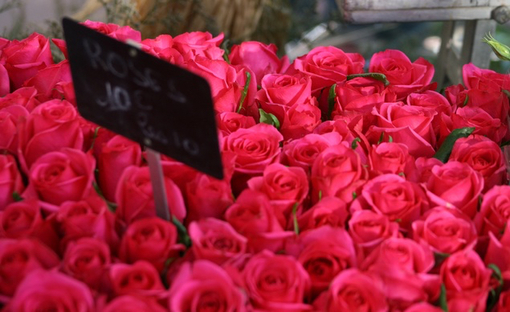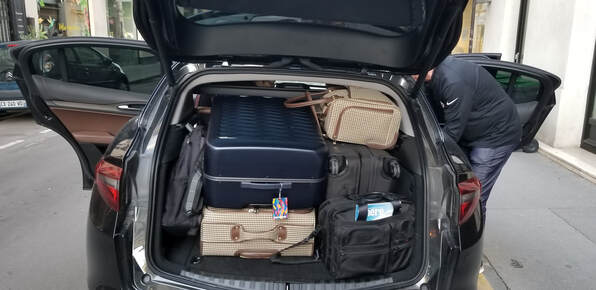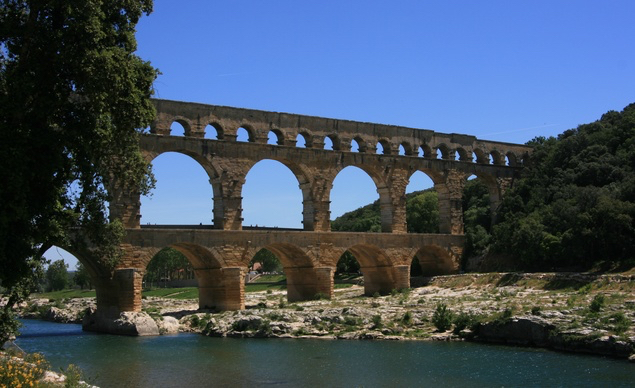Flights
- For finding the best flights, we like Skiplagged because it looks at cost-saving alternate routes. And we like Skyscanner because it seems to include all airlines including some bargain-basement ones. With either of these two, we've actually figured out round-trip flights for less than $700, although they weren't particularly convenient. Some people find Expedia useful for booking, and, like many airlines, you can cancel bookings if you change your mind within 24 hours. Be wary of listings that send you to travel agencies--some are okay, some are quite sloppy. I prefer websites that book directly with the airlines. Or I find the flights I like on one of the websites, then book them on the airline website. Generally, expect to spend about $800-$1600 per RT flight.
- When to book can be up for debate, but I have found that the earlier I book, the cheaper the flights. Since I tend to fly to France at the same time each year, I have found flights for under $700 (in April) by booking a few months in advance, whereas the same flight cost me $1500 when I booked only a few weeks in advance.
- When arriving from the United States, you will have to go through customs when you first land. So be sure you have enough time (I prefer 75 minutes or more, 90 or more if going through DeGaulle-- in fact, I prefer 2 or more hours at DeGaulle when possible) before you need to get to your connecting flight. Airlines often offer connections of only 40 or 50 minutes-- you can probably make it, but I'd try to sit near the front of the plane and be ready to do some fast walking when it lands.
- We don't have a favorite airline-- we book on price and convenience. We have most often flown with Lufthansa or Air France. We've also used TAP (Portugal Airlines) because you can get fairly cheap flights if you are able to stopover in Lisbon for a few days. (It's a special TAP stopover program.)
Cars
- Book your rental car, if you are using one. Pick up and return at airport is easiest. The major rental companies have similar charges. Although it's worth double-checking, we prefer Avis or Hertz or Enterprise, depending who offers the better price. I'm wary of the european rental agencies.
- Technically you may need an international driver's license (although I've never had one). Your local AAA office provides them for free.
- Signs are well-posted and a good map will get you anywhere. So you can skip the electronics if you'd like. But we do like using a GPS with current French maps which often takes us down usual paths. You can rent one with your car, but the charge is significant (more than the cost of buying your own basic Garmin and bringing it with you, actually).
- The best map of the area is Michelin #337 Lot, Tarn-et-Garonne, available on Amazon and very available in the Tabac shops all over France. And there's usually one or two at the house.
Your Bank, Your Passport, Your Cell phone
- Contact your ATM bank and credit card company with the dates of your travel. Travel with a card that uses the chip, if possible. If not, you may have to instruct some shopkeepers on how to slide the credit card through the side of their machine (they are only used to inserting cards with chips).
- Make sure your passports are in order. If they are ripped, badly stained, or seriously marked up, I'd suggest getting them replaced. We know someone sent back to America because a corner was torn off of one of the back (empty) pages.
- Contact your wireless service provider about international phone use and data plans. (There is a phone, with free U.S. calls, at the house, and there is wifi at the house, if you prefer Skype, WhatsApp, or Instagram, for calling.) The travel author, Rick Steves, has some excellent tips on using cell phones in Europe. Here's the link: Steves on Cell Phones
- Set up WhatsApp on your phone, if don't already have it (you can put it on your computer too). It's the best way to communicate with our property managers, neighbors, and cleaners. But if you prefer, phone calls and text messaging are available too.
PACKING
- Layers in all seasons (even summer evenings can get cool at times)
- Shorts and light shirts/blouses (for sunny days and occasional heat waves)
- Warm jacket (as well as sweaters), mainly in April and October
- Basic Toiletries-- shampoo, conditioner, skin creams, etc.-3 oz. or less if in your carry-on. (You can find all these items at any supermarché.)
- Special Toiletries, Medicines, Etc.-- the French pharmacies, although well stocked, may not always have exactly what you need.
- Soap bars, if you prefer them to the bottled soap the cleaners provide.
- Casual attire is fine even in fine restaurants.
- Good walking shoes (water-resistant ideal). The village is steep, cobbled.
- Slippers-- floor is cool, and we prefer no shoes in the house.
- If using our Nespresso machine, please consider buying the eco-friendly, recycleable pods.
- Rain gear/raincoat/umbrella--a lightweight hooded rain parka works well.
- Water shoes, if you like-- part of the sandy beach is a bit rocky.
- For gourmet cooks: any special kitchen items not typically available.
- Laptop or pad, and charger, if desired (free wifi available).
- Bring plug adapters for the French outlets, although there are usually several at the house. (See the Essentials pdf for more info.)
- If you want a tour book of the region before you arrive, “The Rough Guide to Dordogne and the Lot” by Jan Dodd is a good overview of the area. And there's usually a copy at the house.
- You may want to pack a large, light bag for any grocery shopping you do before you arrive. Bags are sold, but not provided, in stores. We have dozens of bags at the house, but you have to get there first. Always remember to bring bags when you go shopping, including outdoor markets.
WHAT'S AT THE HOUSE
- Travel books/maps/tourist info
- Market shopping bags
- Hairdryer (usually two, but sometimes one breaks)
- Towels-- just one large and one small towel per person-- (beige/ivory towels are for house; white towels for the beach)-- you'll need to wash and dry them if you want a fresh towel during the week.
- Sheets, blankets, duvets, pillows, pillow cases-- one set per bed
- Microwave oven
- Nespresso machine (not Keurig, etc.)-- using bio, recyclable pods.
- Toaster
- Electric hot water kettle
- Cooking utensils, including some good chopping knives
- Iron and ironing board
- Large drying rack (we encourage the use of the drying rack when possible)
- Portable radiators
- DVD player, TV (for watching the DVDS-- we do not have television), & a some good DVDs
- Washer and dryer
LANDING (airports, customs, etc.)
- If arriving from outside Europe, give yourself plenty of time for a connecting flight, as you will need to go through customs.
- Toulouse is the closest international airport, a 1 hour 45 minute drive to the village.
- From the Paris airport it is a 6 hour drive; a 3 hour drive from the Bordeaux airport.
- Other airports connected via Paris & within about two hours: North Rodez, East Limoges, South Bergerac, East Carcassonne.
- If you fly in early, Toulouse and Cahors are both lovely cities to spend time in.
- For those who like road trips, flying into Paris or Barcelona (or other places less than a day's drive from the village) can be fun, especially if you are able to spend a few days in those places before driving to the village.
BY TRAIN, BUS, OR TAXI
CAVEATS
- If you fly into Toulouse, and want to drive to the village, make sure you've booked a car in advance through one of the major car rental companies.
- You can get to the village without renting a car. There is a regular train from Toulouse to Cahors— you can buy tickets online. And there are two taxi services in Cahors, and our local livery service, that can take you to the village. See below for contact information. There is also a bus from Cahors to Tour de Faure, just below the village, but it only runs a few times a day.
- You could also contact our local livery service to take you from the airport to the village. Not an inexpensive trip, given time and tolls— probably 110-150 euros.
- Our local livery man is Philippe Merle (very reliable): http://www.taxi-merle.fr/
- The Cahors taxi companies: http://www.cahors-taxi.fr ; http://www.allotaxi-cahors-salviac.fr
- You can take a train from Paris to Cahors-- about a 6 hour journey. Cahors is about 30 minutes from the village. You'd need to rent a car in Cahors, or schedule a taxi drive, or take a bus, to get to the village.
- There is a regular bus between Cahors and Tour de Faure (a short walk across the bridge to the village), but it runs infrequently, so check the schedule.
CAVEATS
- Advance reservations are necessary for English language tours at Pech Merle (www.pechmerle.com/english/visit.html), for bicycle rentals (www.lesptitsvelos-stcirq.fr), for kayak/canoe rentals (Kalapca), and for some of the fine restaurants in the "Recommendations" pdf.
- The streets to the top of the village are steep, easily traversed by most guests, but older guests may want to bring portable walking sticks (or younger family members to lean on).
- Spiders create cobwebs almost as fast as we clean them, and although we rarely see the spiders themselves, don't be frightened by a few cobwebs in the corners and rafters, some of those families may go back 900 years.
- French bats are under government protection, and they fly through the village eliminating mosquitoes. Occasionally they may fly though an open window, but unless you believe in vampires, there is nothing to worry about.
- The kitchen was made for cooks, but occasionally something breaks or a special implement goes missing. Feel free to purchase the needed item and we will reimburse you. Let us know about any breakage when you leave.
- Our cleaners insist on liquid handsoap, so bring or purchase soap bars if you prefer those.
- Global climate change has made our generally temperate climate less predictable. If you come prepared for both cool and warm weather with sporadic stretches of rain, and occasional heatwaves in the summer and wintry winds in spring and fall, nothing should deter you from having a wonderful time.
MISCELLANEOUS
Money
Language
Money
- Withdraw at least 10 euros from the airport ATM (not via the money exchange services). You will need euros for the toll roads from the airport.
- In general, keep a good amount of euros on hand, especially for the outdoor markets and on the off chance that your credit card doesn't work somewhere.
- There is an ATM located at the top of the village. (But on occasion it is out of commission.) We have also used the ATM in Limogne just around the corner from the Sunday Farmer's market.
Language
- You may wish to practice basic phrases (greetings, ordering food, shopping in stores, requesting directions, etc.). Your bookstore and the web will offer many good choices.
- Most of the villagers do not speak English, but many of the shopkeepers speak some, and all our neighbors are proficient. However, folks are friendly, so practice your French and with a little patience (and a good phrase book), you should get all the help you need.
- At the very least, it is important to greet people by first saying "Bonjour." It is considered rude to jump into to a conversation or request without a greeting first.
Friday Night in Cahors: If your flight arrives on a Friday or you are driving down early from Paris or elsewhere, you'll want to stay in Cahors friday night before venturing to our village on Saturday afternoon.
There are advantages to coming early: Cahors is a lovely little city to explore and you'll be able to go to the Saturday morning outdoor market to stock up on food for your stay in St. Cirq Lapopie. (The Cahors market also repeats on Wednesday morning, so you'll have a second chance. We often go both times. And there is the wonderful Limogne market on Sunday, if you miss the Cahors market.)
We've stayed at the Hotel La Chartreuse, which we've found relatively inexpensive, fairly comfortable, and just a short walk to the city center and market. But there are other lovely, fancier hotels, and Cahors has a number of excellent restaurants too. Let us know where you stay, and tell us about your experience.
There are advantages to coming early: Cahors is a lovely little city to explore and you'll be able to go to the Saturday morning outdoor market to stock up on food for your stay in St. Cirq Lapopie. (The Cahors market also repeats on Wednesday morning, so you'll have a second chance. We often go both times. And there is the wonderful Limogne market on Sunday, if you miss the Cahors market.)
We've stayed at the Hotel La Chartreuse, which we've found relatively inexpensive, fairly comfortable, and just a short walk to the city center and market. But there are other lovely, fancier hotels, and Cahors has a number of excellent restaurants too. Let us know where you stay, and tell us about your experience.
Extra Info: Ten Packing Mistakes and How to Avoid Them-- click here (beware of the advertisements).


